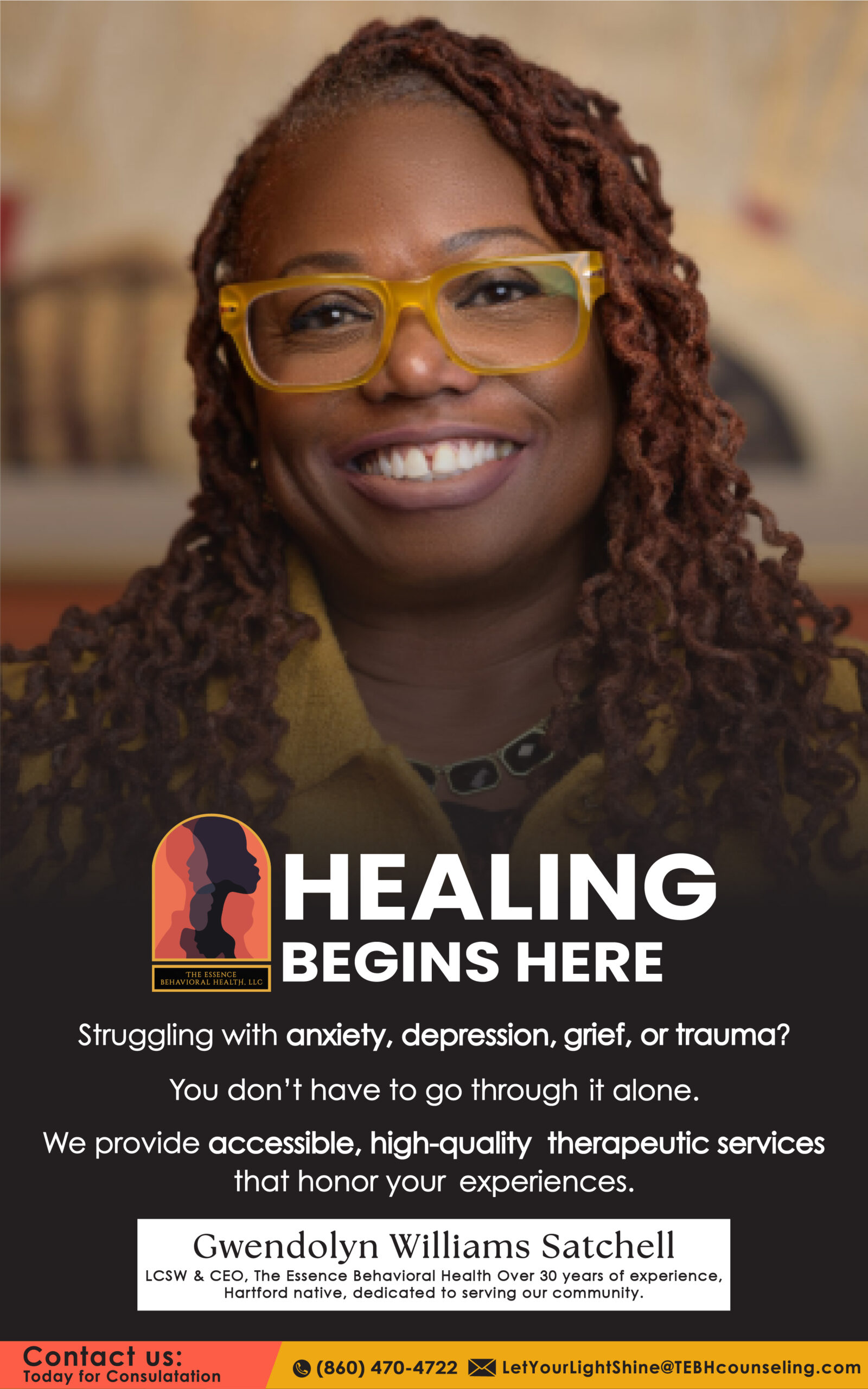By Jamie Shawver, D.O., Trinity Health Of New England
Mental health is as important as physical health—yet too often, it’s treated as a taboo subject, especially in communities that have historically been underserved, over-surveilled, and under-resourced.
In Black communities across America, conversations about mental wellness are gaining momentum—but not fast enough. While awareness is growing, access, stigma, and systemic inequities remain major barriers.
The Mental Health Gap: A Closer Look
- 1 in 4 Black adults in the U.S. will experience a mental health condition at some point, yet only 1 in 3 who need care receive it.
- Black Americans are 20% more likely to experience serious psychological distress than white Americans, according to the U.S. Department of Health and Human Services.
- Yet only 4% of psychologists in the U.S. identify as Black, creating a significant barrier to culturally competent care.
- Experiences of racism and discrimination have been directly linked to poor mental health outcomes, including depression, PTSD, and anxiety.
- Recognizing historical trauma – Slavery, segregation, police violence, and generational poverty have psychological impacts that echo across generations. A trauma-informed approach to care recognizes this without pathologizing Black pain.
These disparities aren’t due to a lack of resilience or strength. They are the result of historic and ongoing inequities—economic, educational, medical, and structural—that have shaped access to care and the narratives around seeking help.
The Consequences of Poor Mental Health
- Depression is associated with a 60% increased risk of developing type 2 diabetes. (Source: CDC & JAMA Psychiatry)
- People with untreated mental illness may die 10 to 25 years earlier than those without, often due to preventable physical health conditions. (Source: National Institute of Mental Health)
- Adults with depression are 64% more likely to develop coronary artery disease.
- Chronic stress and anxiety can lead to increased blood pressure, inflammation, and higher cortisol levels—all of which are risk factors for heart problems. (Source: American Heart Association)
- Stress, anxiety, and depression suppress the immune system, making the body more vulnerable to infections and slower to heal from illness or injury. (Source: American Psychological Association)
Raising awareness is the first step in dismantling the stigma that surrounds mental health. When we normalize discussions about anxiety, depression, trauma, and other mental health challenges, we open the door to healing—not just for individuals, but for families and entire neighborhoods. It also shows younger generations that vulnerability is strength.
Actionable Steps for Your Community
- Talk About It—Openly and Often
Mental health should be as common a conversation topic as physical health. Create safe spaces at home, in schools, in churches, and in community groups where people can speak honestly without judgment. A simple, “How are you really feeling?” can be powerful.
As therapist and advocate Dr. Joy Harden Bradford, founder of Therapy for Black Girls, says: “We’ve internalized the idea that strength means not needing help—but real strength is in seeking support, and in allowing yourself to heal.”
- Know the Signs
Early intervention can make a huge difference. Look for changes in behavior, mood, sleep, or appetite. If someone seems withdrawn, unusually angry, or overwhelmed, they may be silently struggling. Don’t be afraid to check in.
- Encourage Professional Help
Mental illness is not a weakness—it’s a medical condition that deserves proper care. Encourage loved ones to seek counseling or therapy, and lead by example if you’ve benefited from mental health services yourself.
- Support Youth Mental Health
Our young people are facing unprecedented stress—from academic pressure to social media to systemic inequality. Schools, parents, and youth organizations must work together to provide mental health education and emotional support early on.
“When we create safe spaces for young people to be vulnerable, we give them permission to live whole lives,” says Yolo Akili, founder of BEAM (Black Emotional and Mental Health Collective).
- Advocate for Access
Push for better mental health services in your area. This includes advocating for more diverse mental health professionals, funding for local clinics, and mental health education in schools.
Resources You Can Use Right Now
Therapists & Counseling Services:
- Therapy for Black Girls (www.therapyforblackgirls.com) – Directory of culturally competent therapists
- Black Men Heal (www.blackmenheal.org) – Therapy support for Black men
- Open Path Collective (www.openpathcolective.org) – Affordable therapy options
- Clinicians of Color (www.cliniciansofcolor.org) – Directory of mental health providers
Local Organizations:
- NAMI Connecticut (www.namict.org) – Support groups, education, and advocacy
- Mental Health Connecticut (https://www.mhconn.org/our-services/get-help-now/)– Local programs and wellness services
- Primary Care Providers (https://www.trinityhealthofne.org/services/primary-care)
Crisis Support:
- 988 Suicide & Crisis Lifeline – Call or text 988 for 24/7 support
- Crisis Text Line – Text HOME to 741741 to connect with a counselor
You’re Not Alone, Allyship
Every mind matters. Whether you’re personally struggling or want to support someone else, know this: seeking help is a sign of strength. Healing in Black communities must be community-led, culturally grounded, and free from judgment.
As someone outside the community, I believe part of responsible allyship is not just amplifying resources but listening—really listening—to the voices already doing the work.
Mental health isn’t just personal—it’s political, historical, and communal. Together, we can foster a world where everyone has the right to feel seen, heard, and well.





